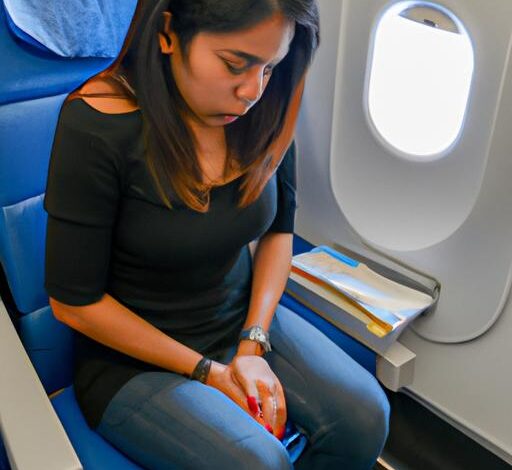Does Traveling Cause Constipation? Exploring the Impact of Travel on Your Digestive Health

Introduction
Have you ever experienced the discomfort of constipation while traveling? It’s not uncommon to find yourself feeling bloated and unable to have a regular bowel movement when you’re away from home. But why does traveling seem to affect our digestive system? Today, I want to delve into this topic and shed light on whether or not traveling can cause constipation.
Understanding Constipation
First, let’s define constipation. It refers to a condition in which you have difficulty passing stools, resulting in infrequent bowel movements or hard, dry stool. Common symptoms include abdominal discomfort, bloating, and a sense of incomplete evacuation. Now, let’s explore whether traveling contributes to this unpleasant condition.
Exploring the Impact of Travel on Your Digestive Health
Traveling often disrupts our daily routine, and this can have repercussions on our digestive system. When we embark on a journey, we may encounter changes in our diet and eating patterns. Indulging in unfamiliar foods or relying on fast food options can lead to a lack of fiber intake, which plays a crucial role in maintaining healthy digestion.
Long-distance travel, especially by air, can also affect our digestive system. Sitting for extended periods can slow down bowel movements and contribute to constipation. Additionally, the stress and anxiety associated with travel can impact the functioning of our digestive system, leading to irregularities.
Importance of Addressing the Issue for Travelers
Addressing constipation is crucial for travelers because it can hinder our overall travel experience. Imagine exploring a new city or embarking on an exciting adventure while constantly feeling bloated and uncomfortable. It not only affects our physical well-being but also dampens our mood and enthusiasm.
Moreover, constipation can lead to other complications such as hemorrhoids and anal fissures. By understanding the causes and implementing preventive measures, we can ensure a smoother and more enjoyable journey.
In the upcoming sections, we will delve deeper into the common causes of constipation while traveling and provide you with practical tips to prevent it. So, let’s embark on this journey together and unravel the mysteries behind traveling and constipation.
Stay tuned for the next section where we will explore the common causes of constipation while traveling and how they can impact your digestive health. Let’s ensure your future trips are free from any discomfort and digestive woes!
Understanding Constipation
Constipation is a common condition that affects people of all ages, and it’s essential to have a clear understanding of its definition and symptoms. Let’s dive deeper into what constipation entails and explore the factors that contribute to this uncomfortable condition.
Definition of Constipation and Its Common Symptoms
Constipation occurs when there is difficulty in passing stools, resulting in infrequent bowel movements or the passage of hard, dry stool. The frequency of bowel movements can vary from person to person, but fewer than three bowel movements per week is generally considered an indicator of constipation.
Common symptoms of constipation include:
-
Abdominal Discomfort: You may experience cramping, bloating, or abdominal pain due to the accumulation of stool in your intestines.
-
Hard, Dry Stool: Stools become hard and dry, making them difficult to pass. You may feel a sense of straining during bowel movements.
-
Feeling of Incomplete Evacuation: Even after a bowel movement, you may still feel like there is stool left in your rectum.
Factors That Contribute to Constipation
Several factors can contribute to the development of constipation, including:
-
Dietary Habits: A diet low in fiber and high in processed foods can lead to constipation. Fiber adds bulk to your stool and helps it move through your digestive system smoothly.
-
Dehydration: Insufficient water intake can cause stools to become hard and difficult to pass. It’s crucial to stay hydrated, especially when traveling, as dehydration is a common occurrence.
-
Lack of Physical Activity: Inactivity can slow down the movement of your digestive system, leading to constipation. When traveling, long periods of sitting during flights or car rides can contribute to this.
-
Changes in Routine: Disruptions to your regular routine, such as time zone changes or irregular meal times, can affect your digestive system and lead to constipation.
Importance of Maintaining Regular Bowel Movements for Overall Well-being
Maintaining regular bowel movements is not only important for avoiding constipation but also for overall well-being. When waste products accumulate in the colon for an extended period, toxins can be reabsorbed into the bloodstream, negatively impacting your health.
A healthy digestive system ensures the efficient absorption of nutrients and the elimination of waste products. It also plays a significant role in maintaining a strong immune system and supporting optimal gut health.
In the next section, we will explore the impact of traveling on the digestive system and how it can contribute to constipation. Understanding these effects will help us develop strategies to prevent and alleviate constipation while on the go. Let’s embark on this journey to better digestive health together!
Impact of Traveling on Digestive System
When it comes to traveling, our digestive system often takes a hit. Let’s explore how changes in routine, diet, and the stress associated with travel can impact our digestive health.
Changes in Routine and Diet while Traveling
One of the main culprits behind constipation during travel is the disruption of our daily routine. Our bodies thrive on consistency, and any sudden changes can throw our digestive system off balance. Traveling often means waking up and sleeping at different times, which can disrupt our natural bowel movement patterns.
Moreover, exploring new destinations comes with indulging in different cuisines. While it’s exciting to try local delicacies, these dietary changes can take a toll on our digestive system. Unfamiliar foods, particularly those high in fat and low in fiber, can slow down the digestive process, leading to constipation.
Effects of Long-Distance Traveling on Bowel Movements
Long-distance travel, especially by air, can have a significant impact on our bowel movements. Sitting for extended periods in cramped spaces restricts our body’s movement and can slow down the digestive process. Lack of movement and physical activity can make it harder for our intestines to propel waste through the digestive tract, resulting in constipation.
Additionally, the change in air pressure during flights can affect our body’s ability to expel gas, leading to discomfort and bloating. These factors combined can contribute to constipation during long journeys.
How Travel-Related Stress Can Affect the Digestive System
Traveling, while exciting, can also be quite stressful. From making travel arrangements to dealing with unexpected delays or language barriers, the stress associated with travel can impact our digestive system. Stress triggers the release of hormones that can slow down digestion and disrupt the natural rhythm of bowel movements. This can result in constipation and other digestive issues.
It’s important to be mindful of the impact that stress can have on our bodies while traveling. Taking steps to manage stress, such as practicing deep breathing exercises or engaging in relaxation techniques, can help promote healthy digestion and prevent constipation.
In the next section, we will explore the common causes of constipation while traveling in more detail. By understanding these causes, we can take proactive measures to keep our digestive system in check during our adventures. So, let’s dive deeper into the factors that contribute to constipation while on the move.
Common Causes of Constipation while Traveling
Dietary changes and lack of fiber intake
When we travel, it’s common to indulge in new cuisines and local delicacies. However, these dietary changes can have a significant impact on our digestive system. Many traditional foods may lack the fiber content necessary to maintain regular bowel movements. Fiber adds bulk to our stool, making it easier to pass through the intestines. Without an adequate fiber intake, constipation becomes more likely.
Dehydration and its impact on bowel movements
Staying hydrated is crucial for our overall well-being, including our digestive health. However, when we travel, it’s easy to forget to drink enough water, especially during busy sightseeing or hectic travel schedules. Dehydration can lead to hardened stools and difficulty in passing them. Lack of water in our system can cause the colon to absorb more water from the stool, making it dry and difficult to eliminate.
Limited access to clean water and healthy food options
Exploring new destinations often means facing challenges in finding clean water and nutritious food options. In some places, tap water may not be safe for consumption, forcing us to rely on bottled water. Unfortunately, changes in water sources can disrupt our gut flora, leading to digestive issues like constipation. Additionally, limited availability of fresh fruits, vegetables, and whole grains can further contribute to constipation due to their high fiber content.
Sedentary lifestyle during long journeys
Whether it’s a long flight, train ride, or road trip, extended periods of sitting can hinder our digestive system’s functionality. Physical activity stimulates the muscles in our intestines, promoting regular bowel movements. However, during travel, we often find ourselves sitting for hours on end, restricting the natural movement of our digestive tract. This lack of physical activity can slow down bowel movements and contribute to constipation.
By understanding these common causes of constipation while traveling, we can take proactive measures to prevent it. In the next section, I will share valuable tips to help you maintain a healthy digestive system during your journeys. Let’s ensure that constipation doesn’t dampen your travel adventures!
Tips to Prevent Constipation while Traveling
Maintain a Balanced Diet and Include High-Fiber Foods
When you’re on the go, it’s easy to fall into the trap of indulging in unhealthy, low-fiber options. However, maintaining a balanced diet is crucial to keep your digestive system running smoothly. Incorporate high-fiber foods like fruits, vegetables, whole grains, and legumes into your meals. These fiber-rich choices will promote regular bowel movements, preventing constipation from ruining your travel plans.
Stay Hydrated and Drink Plenty of Water
Dehydration is a common trigger for constipation, and it’s especially important to stay hydrated while traveling. Make it a priority to drink plenty of water throughout your journey. Carry a reusable water bottle with you and refill it whenever possible. Avoid excessive consumption of caffeine and alcohol, as they can contribute to dehydration. By keeping your body well-hydrated, you’ll help maintain optimal digestive function.
Exercise and Stretch Regularly during Travel
Sitting for prolonged periods during travel can hamper your bowel movements. Combat this by incorporating regular exercise and stretching into your travel routine. Take short walks whenever you have the opportunity, whether it’s during a layover at the airport or a rest stop during a road trip. Simple stretching exercises, such as leg lifts and torso twists, can also help stimulate your digestive system and keep things moving smoothly.
Establish a Regular Bathroom Routine
Traveling disrupts our usual daily routines, including bathroom habits. However, it’s vital to establish a regular bathroom routine even when you’re on the go. Don’t ignore the urge to use the restroom, as holding it in can contribute to constipation. Take advantage of bathroom facilities whenever they’re available, even if it means making a quick pit stop. Your digestive system will thank you for it.
Consider Using Natural Remedies or Over-the-Counter Medications if Needed
If you’re prone to constipation while traveling, consider carrying natural remedies or over-the-counter medications as a backup plan. Natural remedies like herbal teas, prune juice, or even probiotic supplements can help regulate your bowel movements. However, it’s always advisable to consult with a healthcare professional before starting any new medications or supplements.
By implementing these tips, you can significantly reduce the likelihood of experiencing constipation during your travels. Remember, prevention is key, and a little extra effort can go a long way in ensuring a comfortable and enjoyable journey.
Stay tuned for the concluding section, where we will recap the main points discussed and emphasize the importance of maintaining regular bowel movements while traveling.
Conclusion
After exploring the impact of travel on our digestive health, it’s evident that traveling can indeed cause constipation. The changes in routine, diet, and lifestyle that accompany our journeys often disrupt the natural rhythm of our digestive system, leading to uncomfortable symptoms.
To prevent constipation while traveling, it’s important to prioritize our digestive health. Incorporating a balanced diet with ample fiber, staying hydrated, and engaging in physical activity during travel can greatly contribute to maintaining regular bowel movements. Establishing a bathroom routine and considering natural remedies or over-the-counter medications when needed can also provide relief.
Remember, addressing constipation is crucial for a pleasant travel experience. By taking proactive steps to prevent and alleviate constipation, we can ensure that our trips are filled with joy, exploration, and comfort.
So, the next time you embark on a journey, don’t let constipation hinder your adventure. Be mindful of your digestive health and follow the tips provided in this article. Bon voyage and safe travels!
Thank you for joining me on this informative journey. I hope this article has shed light on the connection between traveling and constipation, and equipped you with valuable insights to maintain optimal digestive health while on the go. Happy travels!
Conclusion: So above is the Does Traveling Cause Constipation? Exploring the Impact of Travel on Your Digestive Health article. Hopefully with this article you can help you in life, always follow and read our good articles on the website: Game Zone



